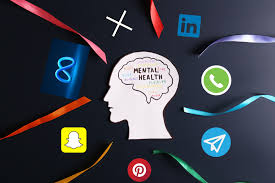Samson Ololade, an undergraduate at the University of Abuja, spends an average of 5 hours on the Internet daily, surfing through live feeds on TikTok while bantering with friends on WhatsApp. Like many young Nigerians, social media has become an integral part of his life. But the question remains: how is this digital dependence shaping the mental well-being of the country’s youth?
While concerns about the negative impact of social media on mental health are valid, focussing solely on its downsides overlooks the potential for positive change.
A 2023 survey by DataReportal found that 65% of Nigerian youths feel that influencers affect their self-esteem and aspirations. Favour Ojeniyi, another young social media user, shares that seeing successful peers online makes her feel motivated: “It helps my self-esteem. When I see people closer to my age achieving great things, it inspires me to do more.” While some feel inspired, others, like Samson, struggle with the pressure to measure up to these online images, leading to feelings of inadequacy.
Recognising the challenges that come with social media, several organisations are stepping up to guide Nigerian youths on how to protect their mental health online. The Mentally Aware Nigeria Initiative (MANI) is one such group, working to educate young people on responsible social media use. Their digital literacy programmes focus on recognising signs of mental distress, managing screen time and avoiding unhealthy comparisons.
MANI’s workshops teach youths the importance of taking regular breaks from social media, often referred to as “social media detoxes.” These breaks allow individuals to recharge, refocus on offline activities, and reconnect with their surroundings. Favour, who took a social media detox last December, recalls the experience as “healing” and said it helped her focus more on family and personal well-being. Similarly, Samson shared that his month-long break wasn’t easy but was crucial for his mental health.
Celebrities have also embraced social media detoxes and have reported positive effects on their mental health.
Building a Healthier Digital Future
Ultimately, addressing the mental health impacts of social media among Nigerian youths requires a multi-faceted approach that includes individual, community, and institutional efforts. Encouraging digital literacy, fostering supportive online environments, and providing access to mental health resources are essential steps in promoting healthier social media habits.
Access to Mental Health Support
Ultimately, improving access to mental health services will go a long way. Organisations like She Writes Woman and MANI offer affordable or free online counselling sessions, specifically designed to address the mental health challenges associated with social media use. However, many young Nigerians are still unaware of these services. Favour and Samson, for example, admit to never using mental health counselling platforms but expressed openness to trying them if recommended.
Samson Ololade, a student at the University of Abuja, typifies the digital habits of many young Nigerians, spending significant time on social media platforms like TikTok and WhatsApp. This digital dependency raises questions about its impact on their mental well-being. While social media can negatively affect self-esteem, it also offers motivational benefits. A 2023 DataReportal survey found that 65% of Nigerian youths feel influenced by social media, with some like Favour Ojeniyi finding inspiration and others like Samson experiencing pressure and inadequacy.
Organizations such as the Mentally Aware Nigeria Initiative (MANI) are actively educating youths on managing their mental health online through digital literacy programs. These programs emphasize recognizing mental distress, managing screen time, and the benefits of social media detoxes. Such detoxes, embraced by both individuals and celebrities, help improve focus on offline activities and overall well-being.
Addressing the mental health effects of social media on Nigerian youths requires a collaborative approach, including enhancing digital literacy, creating supportive online spaces, and providing accessible mental health resources. Organizations like She Writes Woman and MANI offer online counselling services to tackle these challenges, though awareness of these services remains low among the youth.






